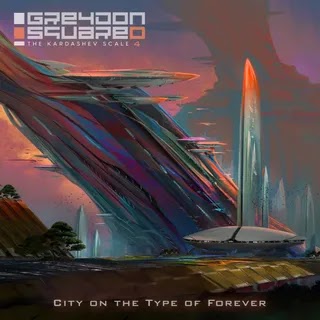Earnestly didactic “conscious” hip-hop is easy to mock but hard to do well. The Compton rapper’s rhyme schemes are persuasive even when his arguments don’t withstand close scrutiny.
Greydon Square is a forty-something rapper from Compton who belongs to the time-honored lineage of wrinkled-forehead, pressured-speech word-nerd rappers. Think your Aesop Rocks, your Gift of Gabs, your Ras Kasses—anyone whose raps might fall into a tag cloud of “third eye,” “the plan,” and/or “the singularity.” The title of his latest album, Type 4: City on the Type of Forever, likely refers to the classic Harlan Ellison-penned 1967 Star Trek episode “The City on the Edge of Forever,” in which Captain Kirk must let Joan Collins die in order to somehow stop Hitler (it’s complicated), and as the “Type 4” hints, it belongs to a series—in this case, a “quadrilogy” of albums inspired by the Kardashev Scale, which was invented by the Russian astronomer Nikolai Kardoshev in 1964 to measure a society’s ability to harness its technology. It’s… a lot, and so are the rapper’s verses— “Cosmic accosted/Obelisk hostage/monolith option from the ominous doctrine” is an incredibly representative stretch of rhymes.
And yet it’s a testament to Greydon, aka Eddie Collins, that even his nonsensical lines sound compelling. “I bet you didn’t even know that colors could move, did you?” he asks on the title track, and his baritone is so commanding that you might find yourself reflexively shaking your head: No, Greydon, I simply had no idea. With his deep, glassy monotone, he sounds a little like if Guru binged too many YouTube documentaries, and this smooth voice anchors him across some choppy waters where you’re not entirely sure what societal ills he’s addressing—complacency? Lack of empathy? Manufactured consent? (Probably all of those.) Greydon Square understands and exploits what I’ll call the Lupe Loophole, which holds that even your preposterously half-baked ideas will ring true if you flow slickly enough.
Earnestly didactic hip-hop in this vein is easy to mock but incredibly hard to do well: At its best, galaxy-brain “conscious” rap encourages you to make connections between disparate ideas not so much through demonstration as by suggestion. What does a stray shot like “open range, broken with nothin’ but hope and change” (from album highlight “Hindsight”) say, exactly, about the unfulfilled promises of the Obama years? I have no idea, but the urgency in Collins’ voice makes me ponder the question for half a beat longer than I would if he lectured me straight, as does the fact that he’s onto something else in the very next bar.
Like a lot of conscious rappers, Collins’ music feels most magnetic when he keeps the outlines of his critiques broad, allowing his music to remain slippery, allusive, suggestive. The production, from a number of sources including Collins himself, helps, wreathing his voice in profundity-boosting astral synths that heighten the atmosphere more than any single bar. The narcotic pull of conspiracy theorizing, after all, has nothing at all to do with details and everything to do with that heady sensation that all of your troubles are linked in a pattern whose broad outlines are just becoming visible. Or, in other words: No one knows what it means, but it’s provocative; it gets the people going.
Collins is a fascinating character—a military vet who served in the Iraq war; a fierce atheist who regularly discusses the subject on talk shows; a former physics major and an outspoken antinatalist, or someone who believes fervently in not having children. He’s dropped a number of songs directly espousing these beliefs, laying out powerful arguments that probably matter very much to people caught up in the debate but have limited use outside those arenas. He dials back that tendency on Type 4, but on “6th,” for example, he raps pretty directly about his political disillusionment, railing against the “false duopoly” of the political system, the tokenizing paternalism of “limousine liberals,” the hypocrisy of “corporate socialism,” the fruitlessness of voter-shaming a disenfranchised populace. All cogent points, and yet I find there isn’t much to do with them other than to shrug and say “yeah.” Meanwhile, when he raps, “There in the crease, we buried it—a vision, lifted into position/A neo-view, often too vivid! I’m the illest to ever convert oxygen into CO2,” I am left awestruck, the afterimage of the words (a neo-view, too vivid!) dancing across my brain.



0 comments:
Post a Comment